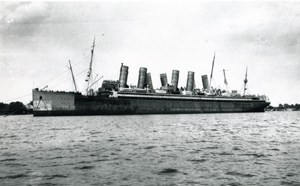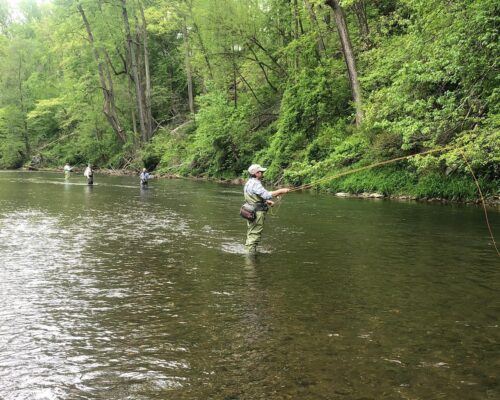Sometime in the 1930s, the Reverend Benjamin Lovett purchased a wooden lifeboat off a mothballed passenger ship that lay off Solomons Island, part of the Ghost Fleet remaindered from World War I. This was no ordinary ship. Renamed the U.S.S. Mount Vernon when she was commandeered by the U.S. Navy at the start of the war, she had begun life as the Kronzprinzessin Cecilie, launched in 1906 and named for Kaiser Wilhelm’s daughter-in-law, Crown Princess Cecilie of Prussia.
Loaded with passengers and some 3 million dollars’ worth of gold, the luxury liner was heading home to Germany when the outbreak of the war in 1914 forced her to return to a neutral U.S. port to avoid capture by British or French cruisers. By 1917 she was carrying American troops and materiel to Europe. She made nine successful trips, and was torpedoed once but was able to limp into port for repairs. At the close of the war, she was turned over to the U.S. Shipping Board and laid up at Solomons Island, where the Reverend Lovett spotted the wooden lifeboats that still hung from davits on her deck and arranged to buy one.
Lovett wasn’t particularly interested in the ship’s storied past. Instead he had the 30-foot lifeboat delivered to his summer retreat on Hungerford Creek, off the Patuxent River just above the Navy Recreation Center. There he hauled it out of the water and used it as the foundation for a house and chapel. For 80 years boaters on the creek regarded it as a unique local landmark.
The Ark went through several changes of ownership until this year when Robert Moeller of Lusby, Md., donated the deteriorating vessel to the Calvert Marine Museum. Whether it remains permanently at the museum remains to be seen—it needs significant repair and a new cradle.
According to a recent press, the museum will be looking for a long-term home for the Ark, where this unique piece of Calvert County’s maritime heritage can be appreciated. In the meantime, research into its history continues. If you have information or photographs to share, please contact museum curator Richard Dodds at 410-326-2042 ext. 31 or doddsrj@co.cal.md.us.




